Searched: Africa
News
The plan would organize UMC churches in four global regions, with each given more leeway around same-sex marriage and other theological issues.
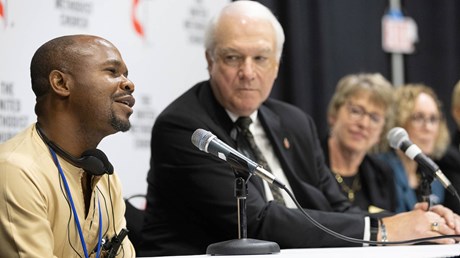 The top legislative body of the United Methodist Church passed a series of measures Thursday to restructure the worldwide denomination to give each region greater equity in tailoring church life to its own customs and traditions.The primary measure, voted on as the UMC General Conference met at the Charlotte Convention Center in North Carolina, was an amendment to the church’s constitution to divide the denomination into four equal regions—Africa, Europe, the Philippines, and the United States.According to the plan, each region would be able to customize part of the denomination’s rulebook, the Book of Discipline, to fit local needs. While church regions in Africa, the Philippines, and Europe have already enjoyed some leeway in customizing church life, the United States has not.The vote on the constitutional amendment passed 586–164, or by 78 percent, which means it surpassed the two-thirds majority needed for constitutional amendments. It must now go before each smaller church region, called an annual conference, for ratification by the end of 2025.If ratified by two-thirds of delegates to the annual conferences, the restructuring would allow the four regions to set their own qualifications for ordaining clergy and lay leaders; publish their own hymnal and rituals, including rites for marriage; and establish its own judicial courts. A new Book of Discipline would have one section that could be revised and tailored for each of the four regional conferences.The two-week worldwide meeting is the first meeting of the General Conference in five years, due mostly to delays associated with the COVID-19 pandemic. It follows a painful schism that has split some 7,600 US-based churches from the denomination—a ...Continue reading... The top legislative body of the United Methodist Church passed a series of measures Thursday to restructure the worldwide denomination to give each region greater equity in tailoring church life to its own customs and traditions.The primary measure, voted on as the UMC General Conference met at the Charlotte Convention Center in North Carolina, was an amendment to the church’s constitution to divide the denomination into four equal regions—Africa, Europe, the Philippines, and the United States.According to the plan, each region would be able to customize part of the denomination’s rulebook, the Book of Discipline, to fit local needs. While church regions in Africa, the Philippines, and Europe have already enjoyed some leeway in customizing church life, the United States has not.The vote on the constitutional amendment passed 586–164, or by 78 percent, which means it surpassed the two-thirds majority needed for constitutional amendments. It must now go before each smaller church region, called an annual conference, for ratification by the end of 2025.If ratified by two-thirds of delegates to the annual conferences, the restructuring would allow the four regions to set their own qualifications for ordaining clergy and lay leaders; publish their own hymnal and rituals, including rites for marriage; and establish its own judicial courts. A new Book of Discipline would have one section that could be revised and tailored for each of the four regional conferences.The two-week worldwide meeting is the first meeting of the General Conference in five years, due mostly to delays associated with the COVID-19 pandemic. It follows a painful schism that has split some 7,600 US-based churches from the denomination—a ...Continue reading... |
The plan would organize UMC churches in four global regions, with each given more leeway around same-sex marriage and other theological issues.
 The top legislative body of the United Methodist Church passed a series of measures Thursday to restructure the worldwide denomination to give each region greater equity in tailoring church life to its own customs and traditions.The primary measure, voted on as the UMC General Conference met at the Charlotte Convention Center in North Carolina, was an amendment to the church’s constitution to divide the denomination into four equal regions—Africa, Europe, the Philippines, and the United States.According to the plan, each region would be able to customize part of the denomination’s rulebook, the Book of Discipline, to fit local needs. While church regions in Africa, the Philippines, and Europe have already enjoyed some leeway in customizing church life, the United States has not.The vote on the constitutional amendment passed 586–164, or by 78 percent, which means it surpassed the two-thirds majority needed for constitutional amendments. It must now go before each smaller church region, called an annual conference, for ratification by the end of 2025.If ratified by two-thirds of delegates to the annual conferences, the restructuring would allow the four regions to set their own qualifications for ordaining clergy and lay leaders; publish their own hymnal and rituals, including rites for marriage; and establish its own judicial courts. A new Book of Discipline would have one section that could be revised and tailored for each of the four regional conferences.The two-week worldwide meeting is the first meeting of the General Conference in five years, due mostly to delays associated with the COVID-19 pandemic. It follows a painful schism that has split some 7,600 US-based churches from the denomination—a ...Continue reading... The top legislative body of the United Methodist Church passed a series of measures Thursday to restructure the worldwide denomination to give each region greater equity in tailoring church life to its own customs and traditions.The primary measure, voted on as the UMC General Conference met at the Charlotte Convention Center in North Carolina, was an amendment to the church’s constitution to divide the denomination into four equal regions—Africa, Europe, the Philippines, and the United States.According to the plan, each region would be able to customize part of the denomination’s rulebook, the Book of Discipline, to fit local needs. While church regions in Africa, the Philippines, and Europe have already enjoyed some leeway in customizing church life, the United States has not.The vote on the constitutional amendment passed 586–164, or by 78 percent, which means it surpassed the two-thirds majority needed for constitutional amendments. It must now go before each smaller church region, called an annual conference, for ratification by the end of 2025.If ratified by two-thirds of delegates to the annual conferences, the restructuring would allow the four regions to set their own qualifications for ordaining clergy and lay leaders; publish their own hymnal and rituals, including rites for marriage; and establish its own judicial courts. A new Book of Discipline would have one section that could be revised and tailored for each of the four regional conferences.The two-week worldwide meeting is the first meeting of the General Conference in five years, due mostly to delays associated with the COVID-19 pandemic. It follows a painful schism that has split some 7,600 US-based churches from the denomination—a ...Continue reading... |
The plan would organize UMC churches in four global regions, with each given more leeway around same-sex marriage and other theological issues.
 The top legislative body of the United Methodist Church passed a series of measures Thursday to restructure the worldwide denomination to give each region greater equity in tailoring church life to its own customs and traditions.The primary measure, voted on as the UMC General Conference met at the Charlotte Convention Center in North Carolina, was an amendment to the church’s constitution to divide the denomination into four equal regions—Africa, Europe, the Philippines, and the United States.According to the plan, each region would be able to customize part of the denomination’s rulebook, the Book of Discipline, to fit local needs. While church regions in Africa, the Philippines, and Europe have already enjoyed some leeway in customizing church life, the United States has not.The vote on the constitutional amendment passed 586–164, or by 78 percent, which means it surpassed the two-thirds majority needed for constitutional amendments. It must now go before each smaller church region, called an annual conference, for ratification by the end of 2025.If ratified by two-thirds of delegates to the annual conferences, the restructuring would allow the four regions to set their own qualifications for ordaining clergy and lay leaders; publish their own hymnal and rituals, including rites for marriage; and establish its own judicial courts. A new Book of Discipline would have one section that could be revised and tailored for each of the four regional conferences.The two-week worldwide meeting is the first meeting of the General Conference in five years, due mostly to delays associated with the COVID-19 pandemic. It follows a painful schism that has split some 7,600 US-based churches from the denomination—a ...Continue reading... The top legislative body of the United Methodist Church passed a series of measures Thursday to restructure the worldwide denomination to give each region greater equity in tailoring church life to its own customs and traditions.The primary measure, voted on as the UMC General Conference met at the Charlotte Convention Center in North Carolina, was an amendment to the church’s constitution to divide the denomination into four equal regions—Africa, Europe, the Philippines, and the United States.According to the plan, each region would be able to customize part of the denomination’s rulebook, the Book of Discipline, to fit local needs. While church regions in Africa, the Philippines, and Europe have already enjoyed some leeway in customizing church life, the United States has not.The vote on the constitutional amendment passed 586–164, or by 78 percent, which means it surpassed the two-thirds majority needed for constitutional amendments. It must now go before each smaller church region, called an annual conference, for ratification by the end of 2025.If ratified by two-thirds of delegates to the annual conferences, the restructuring would allow the four regions to set their own qualifications for ordaining clergy and lay leaders; publish their own hymnal and rituals, including rites for marriage; and establish its own judicial courts. A new Book of Discipline would have one section that could be revised and tailored for each of the four regional conferences.The two-week worldwide meeting is the first meeting of the General Conference in five years, due mostly to delays associated with the COVID-19 pandemic. It follows a painful schism that has split some 7,600 US-based churches from the denomination—a ...Continue reading... |
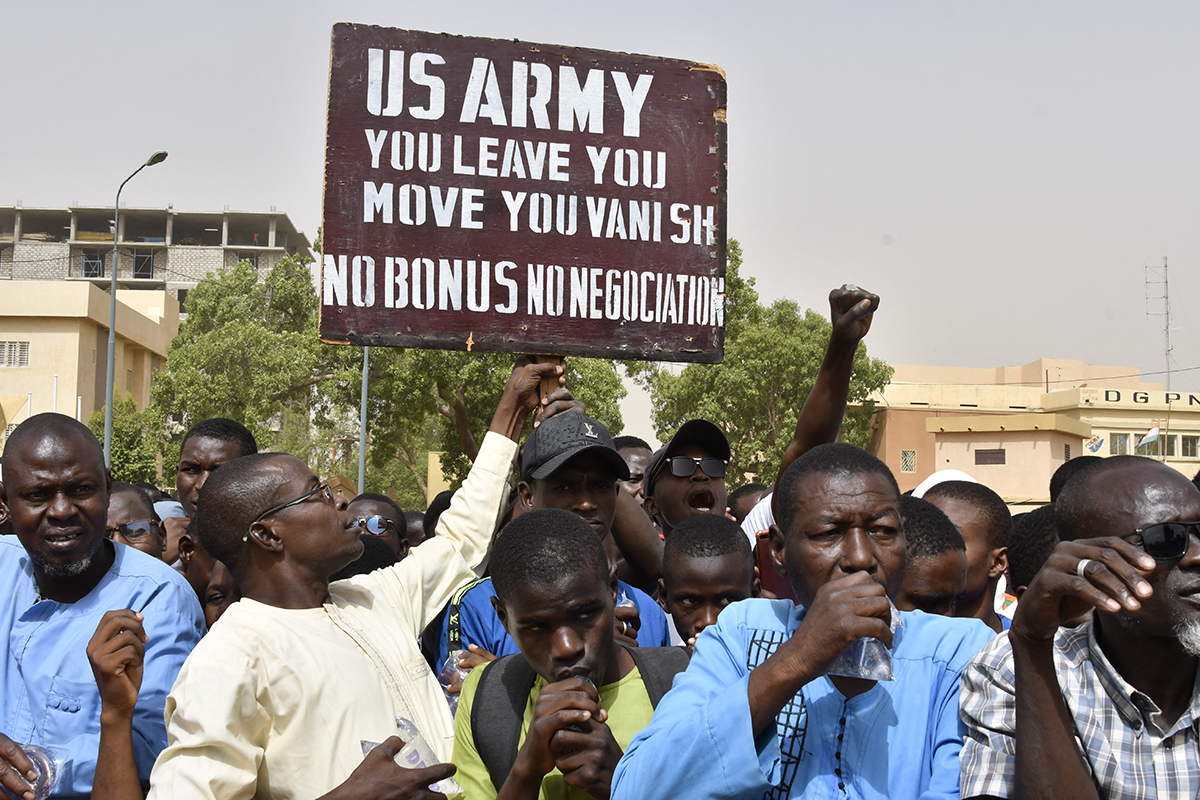 The United States is set to withdraw its military presence from Niger following the release of a report raising questions about U.S. military operations in the African country and warning that troops are on the verge of running out of basic necessities as they remain “stranded” there amid a military coup.? The United States is set to withdraw its military presence from Niger following the release of a report raising questions about U.S. military operations in the African country and warning that troops are on the verge of running out of basic necessities as they remain “stranded” there amid a military coup.? |
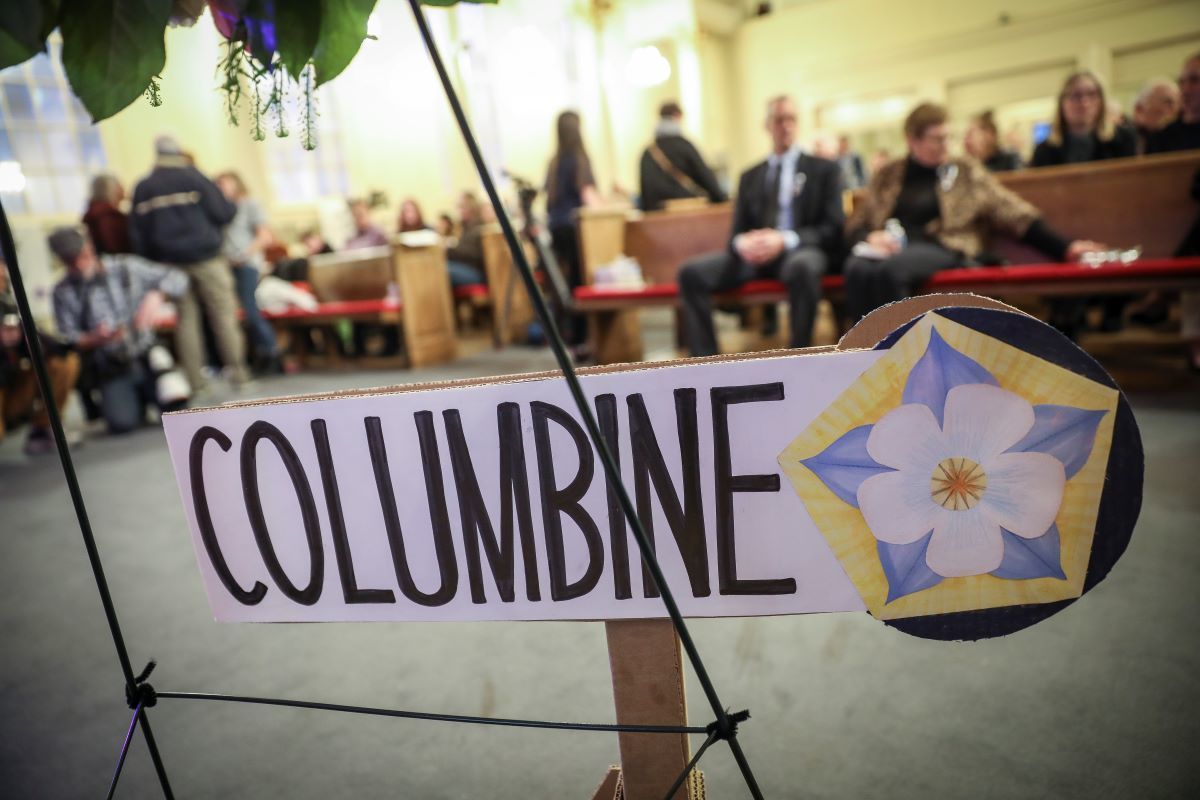 A survivor of the Columbine High School massacre whose sister was murdered in the Colorado school shooting recounted how a mission trip to Africa helped him understand the importance of truly letting go of anger in an attitude of forgiveness.? A survivor of the Columbine High School massacre whose sister was murdered in the Colorado school shooting recounted how a mission trip to Africa helped him understand the importance of truly letting go of anger in an attitude of forgiveness.? |
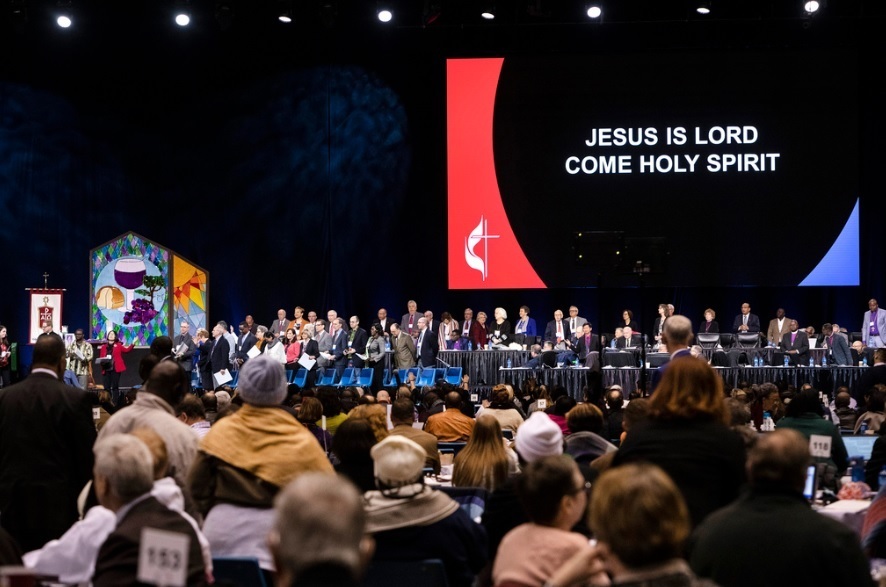 The United Methodist Church Council of Bishops has elected its first African American female president, who will take office in the coming weeks following the departure of over 7,000 churches from the denomination in recent years.? The United Methodist Church Council of Bishops has elected its first African American female president, who will take office in the coming weeks following the departure of over 7,000 churches from the denomination in recent years.? |
Study: 24 percent of clergy in North Carolina are still opposed to same-sex marriage.
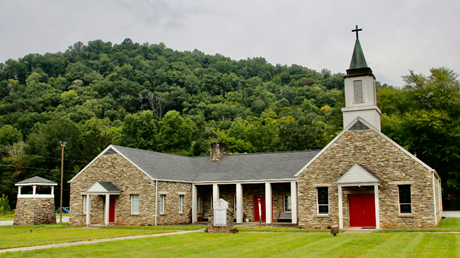 After the departure of thousands of traditionalist United Methodist churches from the denomination over the past five years, it might stand to reason that those congregations remaining in the fold are more progressive and open to ordination and marriage of people in same-sex relationships.But the picture is far more mixed.A new report from the Religion and Social Change Lab at Duke University that looked at disaffiliating clergy from North Carolina’s two United Methodist conferences or regions found that even after the departures, 24 percent of North Carolina clergy remaining in the denomination disagree with allowing LGBTQ people to get married or ordained within the denomination.“At least some amount of ambivalence over LGBTQ+ issues among UMC clergy is likely to persist for years to come,” the report concluded.After a four-year COVID-19 delay and the departure of about 7,600 churches—a loss of 25 percent of all its US congregations—the denomination is likely to reconsider the issue of human sexuality when it convenes its top legislative body April 23–May 3 in Charlotte, North Carolina.Given that the denomination is a worldwide body, with hundreds of delegates from Africa and the Philippines, areas far more conservative in their views of human sexuality, it’s unclear whether the measures stand a chance of passing, even as the US delegation is far more open to such changes.Overall, the Duke report finds that disaffiliating North Carolina clergy were much more politically and theologically conservative than those who chose to remain. Some 85 percent of clergy who left the denomination disagreed with the notion that “all religious leadership positions should be open to people ...Continue reading... After the departure of thousands of traditionalist United Methodist churches from the denomination over the past five years, it might stand to reason that those congregations remaining in the fold are more progressive and open to ordination and marriage of people in same-sex relationships.But the picture is far more mixed.A new report from the Religion and Social Change Lab at Duke University that looked at disaffiliating clergy from North Carolina’s two United Methodist conferences or regions found that even after the departures, 24 percent of North Carolina clergy remaining in the denomination disagree with allowing LGBTQ people to get married or ordained within the denomination.“At least some amount of ambivalence over LGBTQ+ issues among UMC clergy is likely to persist for years to come,” the report concluded.After a four-year COVID-19 delay and the departure of about 7,600 churches—a loss of 25 percent of all its US congregations—the denomination is likely to reconsider the issue of human sexuality when it convenes its top legislative body April 23–May 3 in Charlotte, North Carolina.Given that the denomination is a worldwide body, with hundreds of delegates from Africa and the Philippines, areas far more conservative in their views of human sexuality, it’s unclear whether the measures stand a chance of passing, even as the US delegation is far more open to such changes.Overall, the Duke report finds that disaffiliating North Carolina clergy were much more politically and theologically conservative than those who chose to remain. Some 85 percent of clergy who left the denomination disagreed with the notion that “all religious leadership positions should be open to people ...Continue reading... |
Study: 24 percent of clergy in North Carolina are still opposed to same-sex marriage.
 After the departure of thousands of traditionalist United Methodist churches from the denomination over the past five years, it might stand to reason that those congregations remaining in the fold are more progressive and open to ordination and marriage of people in same-sex relationships.But the picture is far more mixed.A new report from the Religion and Social Change Lab at Duke University that looked at disaffiliating clergy from North Carolina’s two United Methodist conferences or regions found that even after the departures, 24 percent of North Carolina clergy remaining in the denomination disagree with allowing LGBTQ people to get married or ordained within the denomination.“At least some amount of ambivalence over LGBTQ+ issues among UMC clergy is likely to persist for years to come,” the report concluded.After a four-year COVID-19 delay and the departure of about 7,600 churches—a loss of 25 percent of all its US congregations—the denomination is likely to reconsider the issue of human sexuality when it convenes its top legislative body April 23–May 3 in Charlotte, North Carolina.Given that the denomination is a worldwide body, with hundreds of delegates from Africa and the Philippines, areas far more conservative in their views of human sexuality, it’s unclear whether the measures stand a chance of passing, even as the US delegation is far more open to such changes.Overall, the Duke report finds that disaffiliating North Carolina clergy were much more politically and theologically conservative than those who chose to remain. Some 85 percent of clergy who left the denomination disagreed with the notion that “all religious leadership positions should be open to people ...Continue reading... After the departure of thousands of traditionalist United Methodist churches from the denomination over the past five years, it might stand to reason that those congregations remaining in the fold are more progressive and open to ordination and marriage of people in same-sex relationships.But the picture is far more mixed.A new report from the Religion and Social Change Lab at Duke University that looked at disaffiliating clergy from North Carolina’s two United Methodist conferences or regions found that even after the departures, 24 percent of North Carolina clergy remaining in the denomination disagree with allowing LGBTQ people to get married or ordained within the denomination.“At least some amount of ambivalence over LGBTQ+ issues among UMC clergy is likely to persist for years to come,” the report concluded.After a four-year COVID-19 delay and the departure of about 7,600 churches—a loss of 25 percent of all its US congregations—the denomination is likely to reconsider the issue of human sexuality when it convenes its top legislative body April 23–May 3 in Charlotte, North Carolina.Given that the denomination is a worldwide body, with hundreds of delegates from Africa and the Philippines, areas far more conservative in their views of human sexuality, it’s unclear whether the measures stand a chance of passing, even as the US delegation is far more open to such changes.Overall, the Duke report finds that disaffiliating North Carolina clergy were much more politically and theologically conservative than those who chose to remain. Some 85 percent of clergy who left the denomination disagreed with the notion that “all religious leadership positions should be open to people ...Continue reading... |
Study: 24 percent of clergy in North Carolina are still opposed to same-sex marriage.
 After the departure of thousands of traditionalist United Methodist churches from the denomination over the past five years, it might stand to reason that those congregations remaining in the fold are more progressive and open to ordination and marriage of people in same-sex relationships.But the picture is far more mixed.A new report from the Religion and Social Change Lab at Duke University that looked at disaffiliating clergy from North Carolina’s two United Methodist conferences or regions found that even after the departures, 24 percent of North Carolina clergy remaining in the denomination disagree with allowing LGBTQ people to get married or ordained within the denomination.“At least some amount of ambivalence over LGBTQ+ issues among UMC clergy is likely to persist for years to come,” the report concluded.After a four-year COVID-19 delay and the departure of about 7,600 churches—a loss of 25 percent of all its US congregations—the denomination is likely to reconsider the issue of human sexuality when it convenes its top legislative body April 23–May 3 in Charlotte, North Carolina.Given that the denomination is a worldwide body, with hundreds of delegates from Africa and the Philippines, areas far more conservative in their views of human sexuality, it’s unclear whether the measures stand a chance of passing, even as the US delegation is far more open to such changes.Overall, the Duke report finds that disaffiliating North Carolina clergy were much more politically and theologically conservative than those who chose to remain. Some 85 percent of clergy who left the denomination disagreed with the notion that “all religious leadership positions should be open to people ...Continue reading... After the departure of thousands of traditionalist United Methodist churches from the denomination over the past five years, it might stand to reason that those congregations remaining in the fold are more progressive and open to ordination and marriage of people in same-sex relationships.But the picture is far more mixed.A new report from the Religion and Social Change Lab at Duke University that looked at disaffiliating clergy from North Carolina’s two United Methodist conferences or regions found that even after the departures, 24 percent of North Carolina clergy remaining in the denomination disagree with allowing LGBTQ people to get married or ordained within the denomination.“At least some amount of ambivalence over LGBTQ+ issues among UMC clergy is likely to persist for years to come,” the report concluded.After a four-year COVID-19 delay and the departure of about 7,600 churches—a loss of 25 percent of all its US congregations—the denomination is likely to reconsider the issue of human sexuality when it convenes its top legislative body April 23–May 3 in Charlotte, North Carolina.Given that the denomination is a worldwide body, with hundreds of delegates from Africa and the Philippines, areas far more conservative in their views of human sexuality, it’s unclear whether the measures stand a chance of passing, even as the US delegation is far more open to such changes.Overall, the Duke report finds that disaffiliating North Carolina clergy were much more politically and theologically conservative than those who chose to remain. Some 85 percent of clergy who left the denomination disagreed with the notion that “all religious leadership positions should be open to people ...Continue reading... |
Op-Ed by Emily Thompson Several critical issues today affect the continent of Africa, particularly the severe humanitarian crises that have emerged from conflicts, natural disasters,...Amid Major Crises Africa Needs as Much Help as Possible
|
Interview with leader of new evangelical alliance describes his escape from Khartoum and the pressure to pick a side.
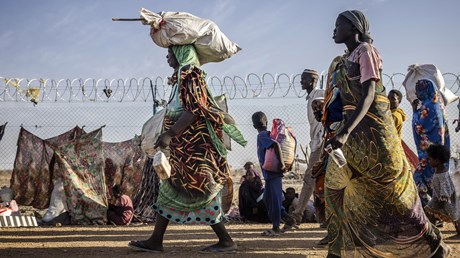 Overlooked by crises in Gaza and Ukraine, Sudan has now endured one year of civil war. Nearly 16,000 people have been killed, with 8.2 million fleeing from their homes—including 4 million children. Both figures are global highs for internal displacement.The United Nations stated that the “world’s worst hunger crisis” is looming, warning that one-third of Sudan’s 49 million people suffer acute food insecurity and 222,000 children could die of starvation within weeks. Yet an international emergency response plan, endorsed by UN agencies including the Cindy McCain-led World Food Program, is only six percent funded.Sudanese Christians feel like “no one cares.”Five years earlier, they had great hope. In 2019 a popular revolution overthrew longtime dictator Omar al-Bashir, wanted for war crimes against his people. The new civilian government repealed the law of apostasy, removed Islamist elements from the bureaucracy, and implemented other democratic reforms. But in 2021 the general of the army, in cooperation with the leader of the Rapid Support Forces (RSF)—a government-aligned paramilitary group accused of the atrocities in Darfur—deposed the prime minister.Continuing negotiations with civilian leaders demanded a merger of the two armed forces, but neither general could agree on terms. And while it is not clear who fired the first shot, last year on April 15 the conflict exploded in the capital of Khartoum. Much of the North African nation is now a war zone.Yet somehow, an evangelical alliance has formed and joined two regional bodies.Rafat Samir, secretary general of the Sudan Evangelical Alliance, witnessed the outbreak of violence firsthand. Now ...Continue reading... Overlooked by crises in Gaza and Ukraine, Sudan has now endured one year of civil war. Nearly 16,000 people have been killed, with 8.2 million fleeing from their homes—including 4 million children. Both figures are global highs for internal displacement.The United Nations stated that the “world’s worst hunger crisis” is looming, warning that one-third of Sudan’s 49 million people suffer acute food insecurity and 222,000 children could die of starvation within weeks. Yet an international emergency response plan, endorsed by UN agencies including the Cindy McCain-led World Food Program, is only six percent funded.Sudanese Christians feel like “no one cares.”Five years earlier, they had great hope. In 2019 a popular revolution overthrew longtime dictator Omar al-Bashir, wanted for war crimes against his people. The new civilian government repealed the law of apostasy, removed Islamist elements from the bureaucracy, and implemented other democratic reforms. But in 2021 the general of the army, in cooperation with the leader of the Rapid Support Forces (RSF)—a government-aligned paramilitary group accused of the atrocities in Darfur—deposed the prime minister.Continuing negotiations with civilian leaders demanded a merger of the two armed forces, but neither general could agree on terms. And while it is not clear who fired the first shot, last year on April 15 the conflict exploded in the capital of Khartoum. Much of the North African nation is now a war zone.Yet somehow, an evangelical alliance has formed and joined two regional bodies.Rafat Samir, secretary general of the Sudan Evangelical Alliance, witnessed the outbreak of violence firsthand. Now ...Continue reading... |
Interview with leader of new evangelical alliance describes his escape from Khartoum and the pressure to pick a side.
 Overlooked by crises in Gaza and Ukraine, Sudan has now endured one year of civil war. Nearly 16,000 people have been killed, with 8.2 million fleeing from their homes—including 4 million children. Both figures are global highs for internal displacement.The United Nations stated that the “world’s worst hunger crisis” is looming, warning that one-third of Sudan’s 49 million people suffer acute food insecurity and 222,000 children could die of starvation within weeks. Yet an international emergency response plan, endorsed by UN agencies including the Cindy McCain-led World Food Program, is only six percent funded.Sudanese Christians feel like “no one cares.”Five years earlier, they had great hope. In 2019 a popular revolution overthrew longtime dictator Omar al-Bashir, wanted for war crimes against his people. The new civilian government repealed the law of apostasy, removed Islamist elements from the bureaucracy, and implemented other democratic reforms. But in 2021 the general of the army, in cooperation with the leader of the Rapid Support Forces (RSF)—a government-aligned paramilitary group accused of the atrocities in Darfur—deposed the prime minister.Continuing negotiations with civilian leaders demanded a merger of the two armed forces, but neither general could agree on terms. And while it is not clear who fired the first shot, last year on April 15 the conflict exploded in the capital of Khartoum. Much of the North African nation is now a war zone.Yet somehow, an evangelical alliance has formed and joined two regional bodies.Rafat Samir, secretary general of the Sudan Evangelical Alliance, witnessed the outbreak of violence firsthand. Now ...Continue reading... Overlooked by crises in Gaza and Ukraine, Sudan has now endured one year of civil war. Nearly 16,000 people have been killed, with 8.2 million fleeing from their homes—including 4 million children. Both figures are global highs for internal displacement.The United Nations stated that the “world’s worst hunger crisis” is looming, warning that one-third of Sudan’s 49 million people suffer acute food insecurity and 222,000 children could die of starvation within weeks. Yet an international emergency response plan, endorsed by UN agencies including the Cindy McCain-led World Food Program, is only six percent funded.Sudanese Christians feel like “no one cares.”Five years earlier, they had great hope. In 2019 a popular revolution overthrew longtime dictator Omar al-Bashir, wanted for war crimes against his people. The new civilian government repealed the law of apostasy, removed Islamist elements from the bureaucracy, and implemented other democratic reforms. But in 2021 the general of the army, in cooperation with the leader of the Rapid Support Forces (RSF)—a government-aligned paramilitary group accused of the atrocities in Darfur—deposed the prime minister.Continuing negotiations with civilian leaders demanded a merger of the two armed forces, but neither general could agree on terms. And while it is not clear who fired the first shot, last year on April 15 the conflict exploded in the capital of Khartoum. Much of the North African nation is now a war zone.Yet somehow, an evangelical alliance has formed and joined two regional bodies.Rafat Samir, secretary general of the Sudan Evangelical Alliance, witnessed the outbreak of violence firsthand. Now ...Continue reading... |
Op-Ed by Emily Thompson Several critical issues today affect the continent of Africa, particularly the severe humanitarian crises that have emerged from conflicts, natural disasters,...Amid Major Crises Africa Needs as Much Help as Possible
|
Ngalakh combines baobab fruit and peanuts to end Easter in West African nation, reciprocated by the sharing of meat breaking Ramadan's fast.
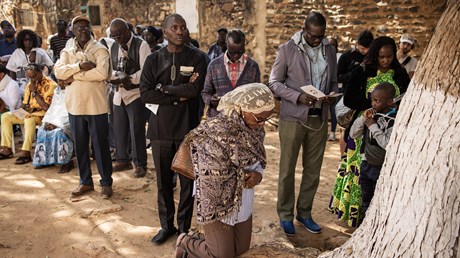 In Senegal, Muslims love to share meat. Christians share porridge.Ending the monthlong Ramadan fast this week, the faithful in the Muslim-majority West African nation invited Christian friends to celebrate Korite (Eid al-Fitr), focus on forgiveness and reconciliation, and share a wholesome meal of chicken.A little over two months later during Tabaski (Eid al-Adha), the mutton from sheep slaughtered in commemoration of Abraham’s sacrificing of his son will likewise be distributed to Christian neighbors. (Both feasts follow the lunar calendar and change dates each year.)But for Christians, the sign of interfaith unity is the porridge-like ngalakh.“Senegal is a country of terranga—‘hospitality’—and the sense of sharing is very high,” said Mignane Ndour, vice president of the Assemblies of God churches in Senegal. “Porridge has become our means of strengthening relations between Christians and Muslims.”Sources told CT the holiday treat is highly anticipated.In the local language, ngalakh means “to make porridge,” and the chilled dessert marks the end of Lent. Between 3 and 5 percent of Senegal’s 18 million people are Christians—the majority Catholic—and families gather to prepare the Easter fare on Good Friday.Made from peanut cream and monkey bread (the fruit of the famed baobab tree), these core ngalakh ingredients are soaked in water for over an hour before adding the millet flour necessary to thicken the paste. The dessert is then variously seasoned with nutmeg, orange blossom, pineapple, coconut, or raisins.Tangy and sweet yet savory, the porridge gets its brownish color from the peanut cream.The Christian community in Senegal traces its ...Continue reading... In Senegal, Muslims love to share meat. Christians share porridge.Ending the monthlong Ramadan fast this week, the faithful in the Muslim-majority West African nation invited Christian friends to celebrate Korite (Eid al-Fitr), focus on forgiveness and reconciliation, and share a wholesome meal of chicken.A little over two months later during Tabaski (Eid al-Adha), the mutton from sheep slaughtered in commemoration of Abraham’s sacrificing of his son will likewise be distributed to Christian neighbors. (Both feasts follow the lunar calendar and change dates each year.)But for Christians, the sign of interfaith unity is the porridge-like ngalakh.“Senegal is a country of terranga—‘hospitality’—and the sense of sharing is very high,” said Mignane Ndour, vice president of the Assemblies of God churches in Senegal. “Porridge has become our means of strengthening relations between Christians and Muslims.”Sources told CT the holiday treat is highly anticipated.In the local language, ngalakh means “to make porridge,” and the chilled dessert marks the end of Lent. Between 3 and 5 percent of Senegal’s 18 million people are Christians—the majority Catholic—and families gather to prepare the Easter fare on Good Friday.Made from peanut cream and monkey bread (the fruit of the famed baobab tree), these core ngalakh ingredients are soaked in water for over an hour before adding the millet flour necessary to thicken the paste. The dessert is then variously seasoned with nutmeg, orange blossom, pineapple, coconut, or raisins.Tangy and sweet yet savory, the porridge gets its brownish color from the peanut cream.The Christian community in Senegal traces its ...Continue reading... |
Ngalakh combines baobab fruit and peanuts to end Easter in West African nation, reciprocated by the sharing of meat breaking Ramadan's fast.
 In Senegal, Muslims love to share meat. Christians share porridge.Ending the monthlong Ramadan fast this week, the faithful in the Muslim-majority West African nation invited Christian friends to celebrate Korite (Eid al-Fitr), focus on forgiveness and reconciliation, and share a wholesome meal of chicken.A little over two months later during Tabaski (Eid al-Adha), the mutton from sheep slaughtered in commemoration of Abraham’s sacrificing of his son will likewise be distributed to Christian neighbors. (Both feasts follow the lunar calendar and change dates each year.)But for Christians, the sign of interfaith unity is the porridge-like ngalakh.“Senegal is a country of terranga—‘hospitality’—and the sense of sharing is very high,” said Mignane Ndour, vice president of the Assemblies of God churches in Senegal. “Porridge has become our means of strengthening relations between Christians and Muslims.”Sources told CT the holiday treat is highly anticipated.In the local language, ngalakh means “to make porridge,” and the chilled dessert marks the end of Lent. Between 3 and 5 percent of Senegal’s 18 million people are Christians—the majority Catholic—and families gather to prepare the Easter fare on Good Friday.Made from peanut cream and monkey bread (the fruit of the famed baobab tree), these core ngalakh ingredients are soaked in water for over an hour before adding the millet flour necessary to thicken the paste. The dessert is then variously seasoned with nutmeg, orange blossom, pineapple, coconut, or raisins.Tangy and sweet yet savory, the porridge gets its brownish color from the peanut cream.The Christian community in Senegal traces its ...Continue reading... In Senegal, Muslims love to share meat. Christians share porridge.Ending the monthlong Ramadan fast this week, the faithful in the Muslim-majority West African nation invited Christian friends to celebrate Korite (Eid al-Fitr), focus on forgiveness and reconciliation, and share a wholesome meal of chicken.A little over two months later during Tabaski (Eid al-Adha), the mutton from sheep slaughtered in commemoration of Abraham’s sacrificing of his son will likewise be distributed to Christian neighbors. (Both feasts follow the lunar calendar and change dates each year.)But for Christians, the sign of interfaith unity is the porridge-like ngalakh.“Senegal is a country of terranga—‘hospitality’—and the sense of sharing is very high,” said Mignane Ndour, vice president of the Assemblies of God churches in Senegal. “Porridge has become our means of strengthening relations between Christians and Muslims.”Sources told CT the holiday treat is highly anticipated.In the local language, ngalakh means “to make porridge,” and the chilled dessert marks the end of Lent. Between 3 and 5 percent of Senegal’s 18 million people are Christians—the majority Catholic—and families gather to prepare the Easter fare on Good Friday.Made from peanut cream and monkey bread (the fruit of the famed baobab tree), these core ngalakh ingredients are soaked in water for over an hour before adding the millet flour necessary to thicken the paste. The dessert is then variously seasoned with nutmeg, orange blossom, pineapple, coconut, or raisins.Tangy and sweet yet savory, the porridge gets its brownish color from the peanut cream.The Christian community in Senegal traces its ...Continue reading... |
A recent news article postulated where humans first went after leaving Africa (supposedly) 60,000 to 70,000 years ago.
|
By Ayang Macdonald The West African nation of Sierra Leone is at full throttle with its digital transformation efforts, and its MOSIP-based foundational identity system...Sierra Leone putting digital ID at the center of its digital transformation agenda
|
A recent news article postulated where humans first went after leaving Africa (supposedly) 60,000 to 70,000 years ago.
|
A recent news article postulated where humans first went after leaving Africa (supposedly) 60,000 to 70,000 years ago.
|
 Fertility rates are expected to fall below the replacement rate in every region of the world except Sub-Saharan Africa by 2040, a new report reveals.? Fertility rates are expected to fall below the replacement rate in every region of the world except Sub-Saharan Africa by 2040, a new report reveals.? |
Reflections on 250 Years of “Amazing Grace”Tyler JohnsonMon, 11/20/2023 - 01:22
 On New Year's Day 1773, John Newton preached from 1 Chronicles 17:16–17. It was during this message that Newton introduced to his congregation a special song—arguably the most well-known hymn of all time—“Amazing Grace.”In 2023, some two-hundred fifty years since “Amazing Grace” was first sung, the message of God's grace is still powerfully ministering through this hymn to people all over the world. But why? Why has “Amazing Grace“ resonated within the hearts of so many since its writing?Deliverance from Spiritual DarknessYou may know that the lyrics to “Amazing Grace” were birthed out of personal testimony. When Newton was just six years old, he lost his mother to tuberculosis, and at only eleven years of age, he joined his father at sea. In years to come, Newton's life took a sharp downward trajectory as he participated in the slave trade, transporting people from the African continent.It was during a particularly stormy journey from Africa to Europe in 1748 that Newton, fearing for his life, began reading the Scriptures and contemplating his faith in God in an attempt to find some comfort for his soul. Although his mother had died early in his life, she had instilled in his heart a scriptural foundation that John remembered then, even within the darkness of the slave trade. God did rescue Newton and the entire crew in that storm. But more significantly, it was through this experience that Newton placed his faith in Christ as his Savior.Newton eventually rejected the ills of the slave trade and became a respected voice in his day against the evils of slavery. Ultimately, he pursued a ministry life in the small English town of Olney.It was in Olney that Newton worked together with his friend William Cowper to produce the well-known collection Olney Hymns. It was in this book that “Amazing Grace” was first published.? The song “Amazing Grace” was birthed against the backdrop of the personal testimony of John Newton and God's great salvation from sin. Light is more readily appreciated in contrast with darkness. Goodness is seen more vibrantly in the face of evil. The beauty of God's grace is demonstrated more dramatically against the ugliness of sin. Shortly before Newton's death, he said, “My memory is nearly gone, but I remember two things: that I am a great sinner, and that Christ is a great Savior.”? On Newton's tombstone is the following inscription: “John Newton, clerk, once an infidel and libertine, a servant of slaves in Africa, was by the rich mercy of our Lord and Saviour Jesus Christ, preserved, restored, pardoned, and appointed to preach the faith he had long labored to destroy.”Delivery of Scriptural DoctrineScriptural worship always begins with properly understood truth. Truth ought to be the driver of our affections and should generate a response within the heart and life of the believer. These responses—whether of praise, surrender, giving, or serving—are the sacrifices of worship we offer to God.? The essential nature of truth in our worship is seen in Jesus' words in John 4:24, “God is a Spirit: and they that worship him must worship him in spirit and in truth.”It is the beautiful communication of truth in “Amazing Grace” that has made it resonate so deeply in the hearts of Christians over the centuries. We sing in this hymn the wonderful realities we as Christians hold dear: the depth of our sin; the richness of Christ's grace and love; the comfort of God's presence, goodness, and care in our lives; and the ultimate hope for the believer in Heaven with God for all of eternity.? The truths expressed in “Amazing Grace” are ultimately a reminder of the unlimited reach of God's grace in our salvation. This is reminiscent of the apostle Paul's encouragement in 1 Corinthians 6:11: “And such were some of you: but ye are washed, but ye are sanctified, but ye are justified in the name of the Lord Jesus, and by the Spirit of our God.”Intergenerational Timelessness of TruthGreat songs are not relegated to a specific time period. In fact, wonderful and doctrinally rich songs communicating truth from God's Word can and are being written today.? Even so, I am appreciative of the heritage that we as believers have in many great songs of the faith. One of the enduring values of a hymn like “Amazing Grace” is that it appropriately and excellently expresses truth about Who our God is, what He has done and desires to do, and what He has given us in Scripture. When we as believers understand these truths and the immeasurable value of our personal relationship with God, our hearts overflow with a desire to sing praise to God.There is great beauty in multiple generations participating in singing corporately to the Lord. “Amazing Grace” contains timeless truth through which both the old and the young, the time-tested Christian and the new believer, and those of any and all cultural and ethnic backgrounds can participate in worshiping the Lord.Isn't that the heart of God's grace? God loved the world (John 3:16, Ephesians 2:4–5, 1 John 4:10), He gave His Son for the world (Luke 19:10, John? 1:17, John 3:16), He extends His grace to the world (Luke? 19:10, 2 Corinthians 8:9, Ephesians 2:4–9), and He desires “that the world through Him might be saved” (John 3:17, Romans 5:8–11, 2 Peter 3:9).May our hearts rest in and be refreshed by His amazing grace, and may we be encouraged to share the story of God's grace with the world!Editor's note: To hear a special 250-year anniversary arrangement of "Amazing Grace," performed by the West Coast Baptist College Choir and directed by Tyler Johnson, click here. Category Music Ministry Tags Music Music Ministry Grace On New Year's Day 1773, John Newton preached from 1 Chronicles 17:16–17. It was during this message that Newton introduced to his congregation a special song—arguably the most well-known hymn of all time—“Amazing Grace.”In 2023, some two-hundred fifty years since “Amazing Grace” was first sung, the message of God's grace is still powerfully ministering through this hymn to people all over the world. But why? Why has “Amazing Grace“ resonated within the hearts of so many since its writing?Deliverance from Spiritual DarknessYou may know that the lyrics to “Amazing Grace” were birthed out of personal testimony. When Newton was just six years old, he lost his mother to tuberculosis, and at only eleven years of age, he joined his father at sea. In years to come, Newton's life took a sharp downward trajectory as he participated in the slave trade, transporting people from the African continent.It was during a particularly stormy journey from Africa to Europe in 1748 that Newton, fearing for his life, began reading the Scriptures and contemplating his faith in God in an attempt to find some comfort for his soul. Although his mother had died early in his life, she had instilled in his heart a scriptural foundation that John remembered then, even within the darkness of the slave trade. God did rescue Newton and the entire crew in that storm. But more significantly, it was through this experience that Newton placed his faith in Christ as his Savior.Newton eventually rejected the ills of the slave trade and became a respected voice in his day against the evils of slavery. Ultimately, he pursued a ministry life in the small English town of Olney.It was in Olney that Newton worked together with his friend William Cowper to produce the well-known collection Olney Hymns. It was in this book that “Amazing Grace” was first published.? The song “Amazing Grace” was birthed against the backdrop of the personal testimony of John Newton and God's great salvation from sin. Light is more readily appreciated in contrast with darkness. Goodness is seen more vibrantly in the face of evil. The beauty of God's grace is demonstrated more dramatically against the ugliness of sin. Shortly before Newton's death, he said, “My memory is nearly gone, but I remember two things: that I am a great sinner, and that Christ is a great Savior.”? On Newton's tombstone is the following inscription: “John Newton, clerk, once an infidel and libertine, a servant of slaves in Africa, was by the rich mercy of our Lord and Saviour Jesus Christ, preserved, restored, pardoned, and appointed to preach the faith he had long labored to destroy.”Delivery of Scriptural DoctrineScriptural worship always begins with properly understood truth. Truth ought to be the driver of our affections and should generate a response within the heart and life of the believer. These responses—whether of praise, surrender, giving, or serving—are the sacrifices of worship we offer to God.? The essential nature of truth in our worship is seen in Jesus' words in John 4:24, “God is a Spirit: and they that worship him must worship him in spirit and in truth.”It is the beautiful communication of truth in “Amazing Grace” that has made it resonate so deeply in the hearts of Christians over the centuries. We sing in this hymn the wonderful realities we as Christians hold dear: the depth of our sin; the richness of Christ's grace and love; the comfort of God's presence, goodness, and care in our lives; and the ultimate hope for the believer in Heaven with God for all of eternity.? The truths expressed in “Amazing Grace” are ultimately a reminder of the unlimited reach of God's grace in our salvation. This is reminiscent of the apostle Paul's encouragement in 1 Corinthians 6:11: “And such were some of you: but ye are washed, but ye are sanctified, but ye are justified in the name of the Lord Jesus, and by the Spirit of our God.”Intergenerational Timelessness of TruthGreat songs are not relegated to a specific time period. In fact, wonderful and doctrinally rich songs communicating truth from God's Word can and are being written today.? Even so, I am appreciative of the heritage that we as believers have in many great songs of the faith. One of the enduring values of a hymn like “Amazing Grace” is that it appropriately and excellently expresses truth about Who our God is, what He has done and desires to do, and what He has given us in Scripture. When we as believers understand these truths and the immeasurable value of our personal relationship with God, our hearts overflow with a desire to sing praise to God.There is great beauty in multiple generations participating in singing corporately to the Lord. “Amazing Grace” contains timeless truth through which both the old and the young, the time-tested Christian and the new believer, and those of any and all cultural and ethnic backgrounds can participate in worshiping the Lord.Isn't that the heart of God's grace? God loved the world (John 3:16, Ephesians 2:4–5, 1 John 4:10), He gave His Son for the world (Luke 19:10, John? 1:17, John 3:16), He extends His grace to the world (Luke? 19:10, 2 Corinthians 8:9, Ephesians 2:4–9), and He desires “that the world through Him might be saved” (John 3:17, Romans 5:8–11, 2 Peter 3:9).May our hearts rest in and be refreshed by His amazing grace, and may we be encouraged to share the story of God's grace with the world!Editor's note: To hear a special 250-year anniversary arrangement of "Amazing Grace," performed by the West Coast Baptist College Choir and directed by Tyler Johnson, click here. Category Music Ministry Tags Music Music Ministry Grace |
I have been inundated by messages from friends across South Africa, and South African natives, ashamed of their government, assuring me the government does not represent the people, and that millions of South Africans stand in firm solidarity with Israel.
|
Tony discusses how NGOs have used PEPFAR funds to push abortion on African countries and the potential ramifications of such moves....
|
 Every December, scores of township churches in South Africa convert into beer pubs, underscoring the underbelly of dire alcohol abuse tearing apart the social fabric of South Africa. Township churches becoming beer taverns just for December is a common phenomenon...The post Every December, some South African churches convert to beer halls appeared first on Baptist News Global. Every December, scores of township churches in South Africa convert into beer pubs, underscoring the underbelly of dire alcohol abuse tearing apart the social fabric of South Africa. Township churches becoming beer taverns just for December is a common phenomenon...The post Every December, some South African churches convert to beer halls appeared first on Baptist News Global. |
 The tiny nation of Botswana — with 2.6 million people — is arguably the U.S.'s most reliable diplomatic and military friend in Africa. Now, a booming economy driven by diamond, copper and rare earth minerals is attracting U.S.-educated Baptist, Pentecostal...The post In Botswana, a booming economy lures U.S.-educated pastors home appeared first on Baptist News Global. The tiny nation of Botswana — with 2.6 million people — is arguably the U.S.'s most reliable diplomatic and military friend in Africa. Now, a booming economy driven by diamond, copper and rare earth minerals is attracting U.S.-educated Baptist, Pentecostal...The post In Botswana, a booming economy lures U.S.-educated pastors home appeared first on Baptist News Global. |



 Links
Links  Articles
Articles  Blogs
Blogs  Videos
Videos  News
News  Colors
Colors 

 New links
New links

